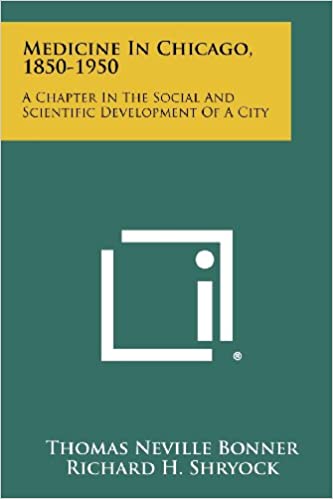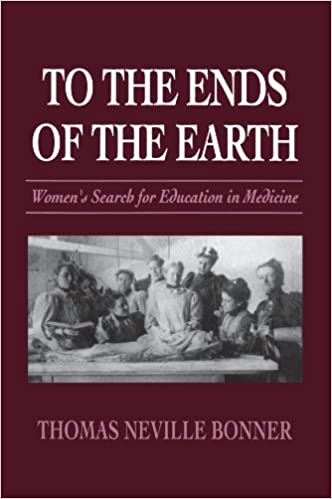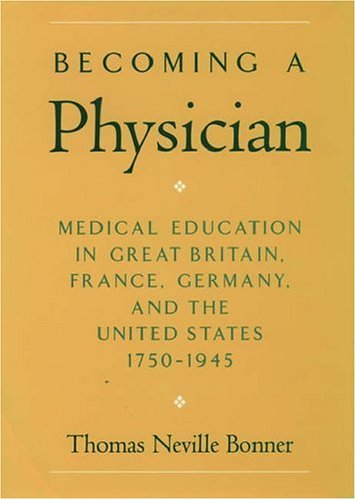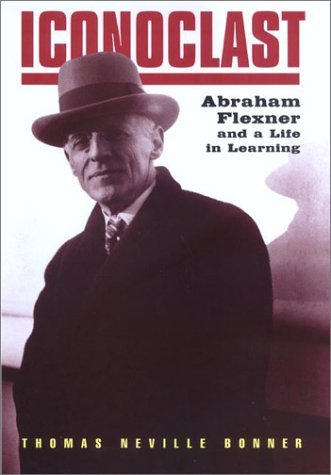Background
Thomas Neville Bonner was born on May 28, 1923, in Rochester, New York, United States. He was the son of John Neville and Mary (McGowan) Bonner.

633 Clark St, Evanston, IL 60208, United States
Northwestern University where Thomas Bonner received his Doctor of Philosophy degree.
500 Joseph C. Wilson Blvd., Rochester, NY 14627, United States
The University of Rochester where Thomas Bonner received his Bachelor of Arts and Master of Arts degrees.

(Medicine in Chicago, 1850-1950 presents a chronological h...)
Medicine in Chicago, 1850-1950 presents a chronological history of medicine in Chicago and has separate chapters on schools, societies and publications, the Chicago Medical Society, hospitals, and public health.
https://www.amazon.com/Medicine-Chicago-1850-1950-Scientific-Development/dp/1258421704
1957

(In this engagingly written book, Thomas Bonner unveils th...)
In this engagingly written book, Thomas Bonner unveils the dramatic story of women's long struggle to become physicians. Focusing both on international comparisons and on the personal histories of many of the pioneers, their determination and dedication, their setbacks and successes, he shows how European and American women gradually broke through the wall of resistance to women in medicine.
https://www.amazon.com/Ends-Earth-Womens-Education-Medicine/dp/0674893042
1992

(Written by eminent education scholar Thomas Neville Bonne...)
Written by eminent education scholar Thomas Neville Bonner, Becoming A Physician is a groundbreaking, comprehensive history of Western medical education. The only work of its kind, it covers the United States, Great Britain, France, and Germany. Comparative in focus, the narrative unfolds within the context of social, political, and intellectual transformations that occurred in Europe and North America between the Enlightenment and Nazi Germany. Viewing the late eighteenth century as a watershed in the development of medical education, Bonner begins by describing how earlier practices evolved in the 1800s with the introduction of clinical practices. He then traces the growth of laboratory teaching in the nineteenth century and the twentieth-century preoccupation with establishing a university standard of medical education. Throughout, Bonner pays particular attention to the students, chronicling their daily lives and discussing changes in the medical school population and the various biases - class, gender, racial, and religious - students and prospective students faced.
http://www.amazon.com/gp/product/0195062981/?tag=2022091-20
1995

(In this, the first biography of Abraham Flexner, Thomas B...)
In this, the first biography of Abraham Flexner, Thomas Bonner offers an engaging and insightful view of one of the most influential figures in twentieth-century American education. Brilliant, abrasive, tenderhearted, and fundamentally a decent, farseeing man, Abraham Flexner accomplished much good in the world. His story, based on new archival sources and told with verve and wit, is sure to become the definitive work on a man and his era.
http://www.amazon.com/gp/product/0801871247/?tag=2022091-20
2002
Thomas Neville Bonner was born on May 28, 1923, in Rochester, New York, United States. He was the son of John Neville and Mary (McGowan) Bonner.
Thomas Bonner began his undergraduate studies at the University of Rochester where he received a Bachelor of Arts degree in 1947 and a Master of Arts degree in 1948. Then he went to Northwestern University and obtained a Doctor of Philosophy degree in 1952.
Thomas Bonner began his career after serving in United States Army Intelligence during World War II and receiving a master's degree in 1948. In 1951 Bonner's academic career began at William Woods College (now William Woods University) in Fulton, Missouri, where he was an academic dean till 1954. He headed the social science department at the University of Nebraska Omaha in 1955-1962.
After a brief stint as a Fulbright lecturer at the University of Mainz in Germany, he became a professor of history and head of the social science department at the Municipal University of Omaha. In 1962 he took a year away from academia to be a legislative assistant to Senator George McGovern. He then joined the University of Cincinnati, where from 1963 to 1968 he was head of the history department, and from 1967 to 1971 was provost and vice president. This led to his three years as president of the University of New Hampshire (1971-1974), followed by four years as the chancellor of Union University.
In 1978 Bonner became president of Wayne State University, where he was especially noted for developing student exchange programs with Germany, Costa Rica, Israel, Poland, and China. He stepped down from office in 1982 but remained at Wayne State as a distinguished professor of history and higher education until his retirement in 1997.
As a historian, Bonner was especially interested in medical history, penning several books on the subject, including Medicine in Chicago, 1850-1950: A Chapter in the Social and Scientific Development of a City (1957) which was a triumphant demonstration of the need to view medicine socially and politically in an urban environment. To the Ends of the Earth: Women's Search for Education in Medicine (1992) was followed by his stellar work, Becoming a Physician: Medical Education in Great Britain, France, Germany, and the United States (1995). It is a comparative history written in Bonner's mature years, whose prodigious research revealed much about the interplay of national medical science in the formation of modern thought and practice.
The capstone of Bonner's scholarship was his last book, Iconoclast: Abraham Flexner and a Life in Learning (2002), wherein the life and medical and social impact of this pioneer in medical education was for the first time studied intensely, passionately, and with the dignity.
Thomas Bonner is remembered as a widely known medical historian who taught at Wayne State University as a distinguished professor of history and higher education after stepping down from the presidency. He was one of the leading medical historians of his generation. Former president of Wayne State University's Academy of Scholars, Bonner received the Gershenson Distinguished Faculty Fellowship Award, the Distinguished Graduate Faculty Award, and the Board of Governors Faculty Recognition Award from the university.
He was listed as a noteworthy history and higher education educator by Marquis Who's Who. He was awarded a prestigious Guggenheim research fellowship twice and also was the recipient of a Fulbright Award to lecture at the University of Mainz in Germany as well as a Hearst Foundation Fellowship to lecture at Northwestern University.
As a historian of medicine, he published important books on topics including Midwestern medicine, medical education in the United States and in European countries, the entry of women into medicine in the 19th century, and on the educator Abraham Flexner. His work, Becoming a Physician: Medical Education in Great Britain, France, Germany, and the United States, 1750-1945, was nominated for a Pulitzer Prize.
(Medicine in Chicago, 1850-1950 presents a chronological h...)
1957(In this, the first biography of Abraham Flexner, Thomas B...)
2002(Written by eminent education scholar Thomas Neville Bonne...)
1995(In this engagingly written book, Thomas Bonner unveils th...)
1992Thomas Bonner was a member of the American Historical Association, Organization of American Historians, American Association for the History of Medicine, Phi Beta Kappa, Pi Gamma Mu, and Phi Alpha Theta.
The cause of Bonner's death was cancer.
Quotes from others about the person
"Tom Bonner was a wonderful colleague and mentor." - Marc Kruman
"He was an exemplary colleague upon whom I often called for advice and who carried more than his share of the service load, in addition to his splendid teaching and impressive research production." - Melvin Small
"As a teacher and publishing scholar, he fulfilled that aim, earning the respect and admiration of his colleagues without ever pulling rank or seeking advantage." - Alan Raucher
Thomas Bonner was married twice. The first marriage produced two children, Phillip Lynn and Diana Joan. Then he married Sylvia M. Firnhaber on December 28, 1984.
